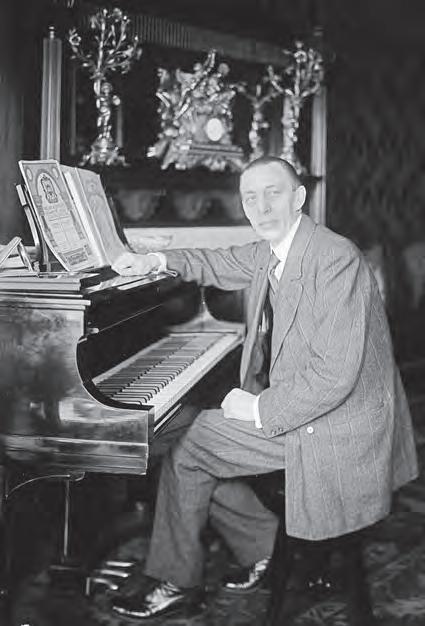
2 minute read
WETA Classical Celebrates Composer Sergei Rachmaninoff
from April 2023 - WETA Magazine
by WETA
By Jim Allison, Program Director, WETA Classical & WETA VivaLaVoce
This month marks the 150th birth anniversary of Sergei Rachmaninoff, one of the most popular composers we play on WETA Classical. Born in Russia on April 1, 1873, he became one of the twentieth century’s greatest pianists and composers. His second and third piano concertos, the Rhapsody on a Theme of Paganini, the second symphony, Vocalise, and Prelude in C-sharp Minor have remained audience favorites year after year.
The classical music world is celebrating Rachmaninoff 150 in many ways. The most impressive feat has already occurred: the “Rachmarathon” of all five works for piano and orchestra — performed in one evening at Carnegie Hall in January. Pianist Yuja Wang joined the Philadelphia Orchestra under Yannick Nézet-Séguin in an astounding display of Rachmaninoff’s creativity as a composer and Yuja Wang’s mastery of these works, which are among the most challenging pieces for a pianist to tackle.
WETA Classical will also join in the Rachmaninoff 150 celebration throughout April. Here are some ways you can learn more about his life and music:
• In our Classical Breakdown podcast episode #50, WETA Classical hosts John Banther and Linda Carducci explore the life and music of Rachmaninoff. And in episode #69, Banther and Bill Bukowski discuss the Rhapsody on a Theme of Paganini, including “breaking down” the compositional trick used in the famous 18th Variation. You can listen at classicalbreakdown.org or on your favorite podcast app.
• Our Classical Score blog will focus on several aspects of Rachmaninoff’s music throughout April. We’ll hear from local performers who are presenting his works and we’ll share resources to help in the enjoyment of his music. Look for the Rachmaninoff collection of articles at classicalscore.org

One of the aspects we’ll explore is what makes the distinctive Rachmaninoff sound. Rachmaninoff stated that “a composer’s music should express the country of his birth, his love affairs, his religion, the books which have influenced him, the pictures he loves.” Although Rachmaninoff lived solely in America and Western Europe after the 1917 Russian Revolution, he never lost his love of his homeland. His fascination with the sound of Russian Orthodox chant, the resonance of cathedral bells, and the expressiveness of Russian folk song forms the basis of his signature sound. On the blog, we’ll share some examples of how his soaring melodies and rich harmonies bear a striking resemblance to the sounds and sights he absorbed early in his life in Russia.
On the blog, we’ll also share news about the restoration of Rachmaninoff’s Villa Senar on Lake Lucerne in Switzerland. It was here that he wrote the Rhapsody on a Theme of Paganini and where he enjoyed driving his speedboat on the scenic lake below the Alps.
On-air, we’ll present Rachmaninoff Moments throughout April. On WETA Classical, we’ll present his many creative and demanding works for solo piano, and his orchestral and chamber music. On WETA VivaLaVoce, we’ll focus on his great choral works, his many art songs, and his three operas. Broadcast details will be available at wetaclassical.org on Rachmaninoff’s birthday, April 1.






